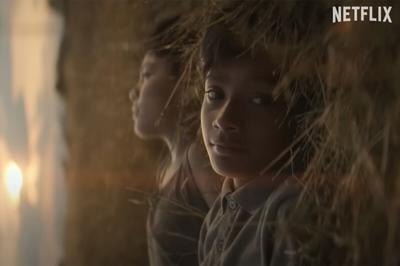“El Secreto Del Río,” or “The Secret of the River,” has made history with Trinidad González becoming the first transgender actress to star in a series by Netflix.
The eight-episode series handles trans and gender nonconforming representation in the most beautiful and impactful way I’ve seen to date on any show or film–especially in a Spanish-language series, considering the gender identity and sexuality taboos that exist in Mexican culture.
In a time in history where trans, gender nonconforming and intersex people are under attack and continue to face oppression when they demand basic human rights, this show beautifully and tactfully represents the true trials and tribulations that trans and gender nonconforming people experience throughout their lives, especially as children.
Throughout the first 4 episodes, we get to know Manuel (Frida Sofía Cruz) and Erik (Mauro Guzmán). The two children, whose ages are not disclosed in the series, become friends and after they experience a traumatic event that shifts their lives forever, they become even closer.
The person who is involved in the traumatic event is a cisgender straight man, who proves to be the real villain of the show. He’s not only proudly an alcoholic, but he also tries to take advantage of one of the children. The way this unfolds shows a side of Latin American culture that is hardly talked about. Many young children experience sexual assault at the hands of family members and close relatives.
When the series begins, Manuel, or Young Sicarú, is new to town and immediately faces rejection because of how feminine he presents. Seeing his femininity, his grandma encourages Manuel to learn about the muxes, who are feminine people that exist outside of the male or female gender binary in Zapotec culture and who are deeply respected by many–but not all.
They are often the subject of scrutiny as a third gender and this series clearly shows that the misogyny that exists in this culture is deeply embedded in the Western European concepts of gender binary and gender roles that are upheld at all costs even in Mexico. This involves a deeper discussion of colonization and imperialism that has forced these systems and ideologies on the indigenous communities that, prior to colonization, accepted third and even fourth genders. This series is based in el Istmo de Tehuatepec.
Within a Christian and Western ideological framework, muxe’s are part of the LGBTQ+ community, which is actually quite inaccurate because that gender classification is not based on sexuality. According to an article on the subject, ‘individuals who identify with a cultural third gender are, in fact, acting within their gender or sex norm.’
This topic is explored in the episode where decades later, Gonzalez’s character returns to her hometown as Sicarú, the transfeminine model who returns not only to mourn the death of a close friend, but also to tie up the loose ends of her late grandmother's abandoned property where another subplot unfolds.
Going back to the first 4 episodes of the series where Manuel and Erik are still children, we see the development of fear that unfolds for the two as they attempt to navigate life after the traumatic experience they shared.
Because of the nature of the events that unfolded, we learn why the children feel as though they cannot trust an adult and be honest about what they witnessed. The children fear the justice system working against them, criminalizing them, rather than seeing them as the victims of the traumatic event. This intense fear is very real for Erik and it causes him to become withdrawn and somewhat depressed. This is a good learning point for parents and any adult in the lives of young children.
Adults need to be a safe space for children, because if not, children are left alone to deal with the consequences and repercussions of situations that were most likely out of their control. They need to confide in adults and trust that we will keep them safe at all costs.
The adult in Young Sicarú’s life who becomes this sort of fairy godparent, is Solange (La Bruja De Texcoco). She is a muxe elder and well-respected member in the Zapotec community. Outside of the series, she is also a musician and an activist for human rights. Young Sicarú takes guidance from Solange and the other muxe’s, who keep Young Sicarú safe from the people in town who cannot come to terms with the femininity that she later embraces.
Jacinto (Jorge A. Jimenez), Erik’s father becomes the one of the series’ villains as he punishes his son for being friends with Young Sicarú, who the town perceives as a muxe, even before she is able to accept that identity. This show does a spectacular job at showing the various faces of machismo that is deeply embedded in Mexican culture and also the difference between muxe’s and transgender people.
In the following 4 episodes of the series, decades pass and as mentioned before, Sicarú returns to the small town as a transfeminine woman who makes it clear to her muxe community that she does not identify as muxe. She identifies as a trans woman and has a conversation with her muxe community about the distinction between the two identities.
She comes in hot. Both in looks and in character. Her character development is incredibly thought-out as we see her go from being a shy, scared child–to a confident woman who is so free in her identity, that she decides to use her freedom to help free others.
This is important to see unfold on-screen because this type of representation is hardly ever seen, much less on the level of discussion that actually has substance and depth.
Trans people are hardly ever portrayed in a positive way that shows how they develop strength and courage as a survival mechanism and use that to enact positive change or leave behind a legacy of progress.
Meanwhile, the case that had been closed for decades regarding the traumatic event that unfolded for Young Sicarú and Erik is reopened by their childhood bully–who unironically becomes a crooked police officer as an adult.
He reopens the case and comes to find out that Sicarú and Erik were involved in the death, making it his mission to extort and harass Sicarú.
Another villain. Another cisgender, straight, man with anger issues and deeply rooted misogyny.
The fourth and final villain of the series is the cisgender, straight, man who is keeping a young boy captive in the abandoned home of Sicarú’s late grandmother.
Sicarú sees herself in the young child and feels as though it is her sacred duty to save him from the abusive and neglectful situation he is in.
Another aspect of the series that was deeply moving and impactful, was the way that muxe’s deaths are handled in Zapotec culture. Because of Western European religious frameworks enforced on the indigenous communities, they believe that Muxe’s must go into the afterlife as either male or female and not a third gender.
This brings up a very deep theme of afterlife and spirituality in relation to gender identity. This is a struggle for trans, gender nonconforming and intersex people as they exist in an identity their friends, family, society, culture or religion might not understand or accept.
Finally, the more-than-platonic relationship that develops between Sicarú and Erik when they are older, is a great conversation point that was also handled with care.
Erik is genuinely confused about his feelings toward Sicarú and the years of misogyny that were forced on him as he grew up, continue to shape his view of gender identity. In some scenes, we see Erik reflecting on what his father would tell him as a child. Alberto Barrera, creator of the series, gives us a unique perspective into Erik’s internal battle by interchanging young Erik and adult Erik in the scenes to help visualize his internal battle. In this scene, we hear Jacinto reinforcing his machismo in the form of homophobia and transphobia toward young Erik.
When they were both younger, they had a third friend in their friend group, Paulina (Yoshira Escarrega), who later becomes Erik’s fiance. She welcomes Sicarú back to town with open arms, only to feel betrayed by her when she finds her and Erik sharing a somewhat intimate moment.
In that moment, Erik confesses his confusion toward accepting Sicarú’s transition and she doesn’t know what to do to make him understand that she is still the friend he’s always cared for. The two navigate a difficult situation in a way that provides the audience with a realistic view of the journey toward acceptance.
There won’t be any spoilers here, but the ending suggests that there is more to come from this series, as a major problem comes to light that brings turmoil to the entire town.











(0) comments
Welcome to the discussion.
Log In
Keep it Clean. Please avoid obscene, vulgar, lewd, racist or sexually-oriented language.
PLEASE TURN OFF YOUR CAPS LOCK.
Don't Threaten. Threats of harming another person will not be tolerated.
Be Truthful. Don't knowingly lie about anyone or anything.
Be Nice. No racism, sexism or any sort of -ism that is degrading to another person.
Be Proactive. Use the 'Report' link on each comment to let us know of abusive posts.
Share with Us. We'd love to hear eyewitness accounts, the history behind an article.